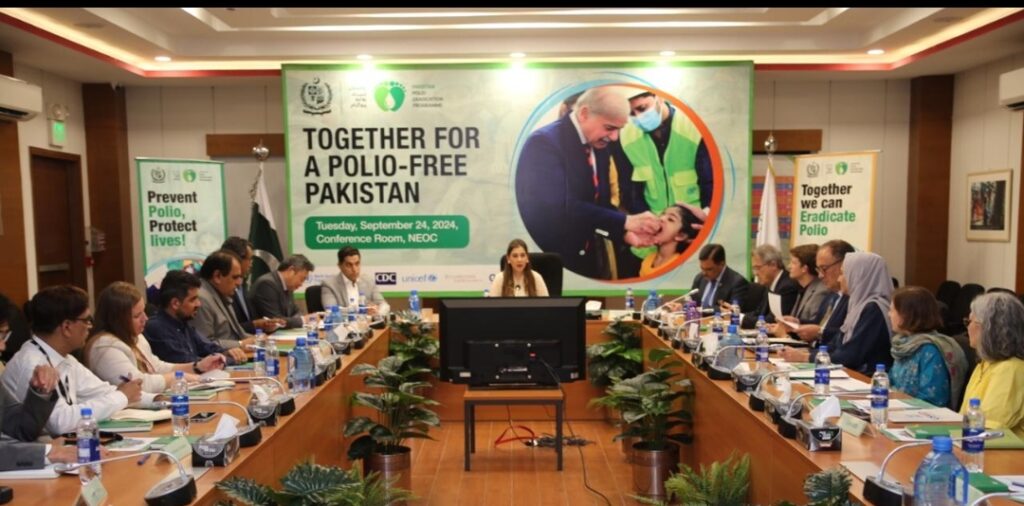
Development partners and donors convened today at the National Emergency Operations Center to renew their commitment and resolve to support the Government of Pakistan in its fight back against polio, a disease which has paralyzed 21 children this year in Pakistan.
The Pakistan Polio Eradication Initiative (PEI), under the leadership of Prime Minister’s Focal Person for Polio Eradication, Ms Ayesha Raza Farooq organized a comprehensive briefing for partners and donors today, apprising them of the current status of the eradication efforts in the country and the consensus national strategy devised to reverse the current disease trends.
Welcoming polio eradication partners and donors, Ms Farooq appreciated their long-standing and unwavering dedication to protecting Pakistan’s children from the devastating effects of poliovirus and contributing to overall child survival.
“The Government of Pakistan has made polio eradication a national priority agenda, with the highest commitment, from the Prime Minister’s office to the Ministry of Health, provincial governments and district administrations,” she said, adding that the provincial government leadership across the political divide is leading the charge on the frontlines.
“While we remained nearly polio-free for 15 months in 2021, we are fighting an intense poliovirus outbreak since 2023,” she said. “Unfortunately, 21 children are affected by polio this year only and the virus has found its way into 67 districts, including previously cleared core reservoirs of Karachi, Quetta block and Peshawar-Khyber.”
Ms Farooq, whose office serves as a direct bridge between the Polio Programme and the Prime Minister’s Office, said that following a critical self-appraisal and extensive consultations with the provinces, a joint roadmap has been formulated to lead the country towards interrupting poliovirus transmission by mid-2025. “We have done some serious reflecting and re-grouping over the past several months, taking stock of where we have gone wrong, and where we need to plug gaps in our programme, including surveillance, communications, campaign operations.
We are confident that we have made a viable strategy for the path ahead to deliver tangible gains during coming months.”
Reiterating the determination of the entire government machinery to eradicate polio, she called for collective action and continued support of all partners to make the dream of a polio-free Pakistan a reality, while staying committed to fulfilling its obligations to maintain global public health.
While updating the partners on the National Emergency Action Plan (NEAP), Coordinator for the National Polio Emergency Operations Center (EOC) Mr Muhammad Anwarul Haq said: “Even one paralyzed child is far too many for any of us working in eradication. The Programme has therefore, strategized to find and vaccinate every missed child both in door-to-door campaigns as well as through the complementary vaccination and integrated services delivery approach, particularly in areas with access challenges.”
He added that the Programme had recently implemented a mass vaccination campaign to immunize over 33 million children against polio.
“We witnessed progress in some of our priority areas, including Balochistan province where we had better access and improved campaign quality. Over the next month we will be doubling down even further to plug the remaining gaps that stand in our way to reaching all children during the remaining two campaigns this year.”
Representatives from partner agencies and donors appreciated Pakistan’s dedication to the goal of a polio-free world. The event was attended by the Country Representatives of WHO and UNICEF, a Trustee of the Rotary Foundation, and representatives from major donor organizations such as the Bill and Melinda Gates Foundation, the Governments of Japan, the UAE, and Canada, as well as the British and Australian High Commissions, the Islamic Development Bank, Qatar Charity, USAID, and the French Development Agency.
They appreciated the open and frank discussions around the new strategy and reaffirmed their commitment to supporting Pakistan as it works to reverse the current trends of poliovirus circulation. “The challenges are enormous but not insurmountable”, the forum felt while reaffirming support for the noble cause of a polio free world.
Abdullah Fadil, UNICEF Representative in Pakistan, said: “Significant progress has been made towards stopping polio, but even a single case is a public health crisis that risks undoing years of effort. We must recognize that polio cannot be eradicated in isolation; addressing related issues like water and sanitation, as well as malnutrition, are essential. We also honor the contributions and sacrifices of those who have lost their lives in this fight. Now more than ever, we must come together, strengthen our collective efforts, and stand united as partners to end polio for good.”
Dr Luo Dapeng, WHO Representative in Pakistan said: “An investment in polio eradication makes a huge difference to children not just in Pakistan, but the world. As we move closer to polio eradication in Pakistan, it is critical that the ongoing support of partner and donor agencies continues so that the gains we have made can remain in place and we cross the finish line.”
Under the directions of the National Task Force headed by the Prime Minister, Pakistan Polio Eradication Programme has rolled out a comprehensive roadmap to improve oversight, management & accountability across the board. A comprehensive exercise has been undertaken during last two months to map the mobile & migrant populations, tailor SBCC strategy to engage with communities and address misconceptions, adopt locally appropriate interventions to consistently vaccinate missed children and provide integrated health services in the polio high risk areas paving the way to interrupt virus circulation.


